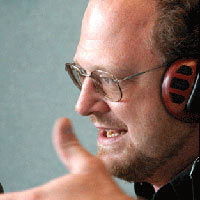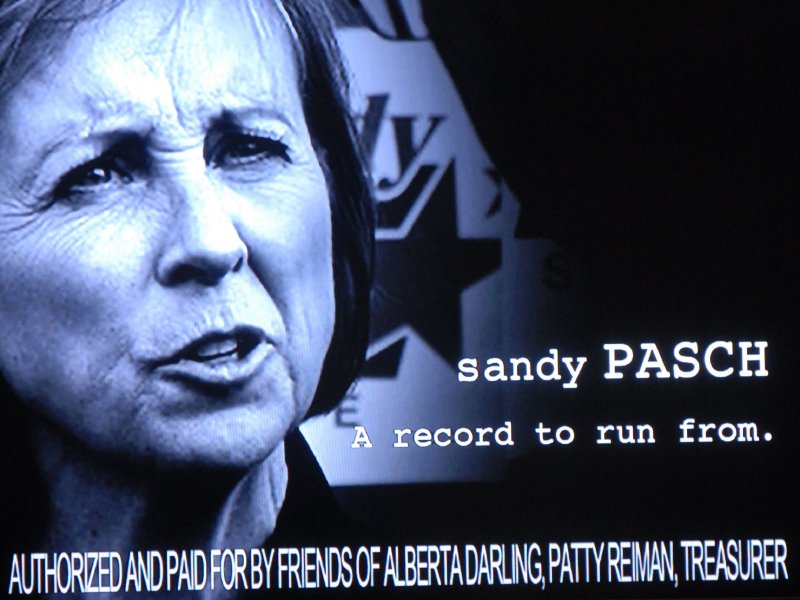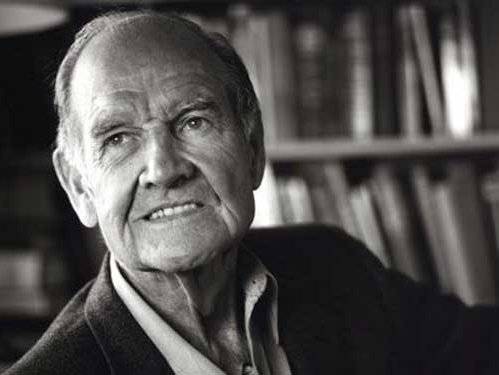The opinions expressed in this piece do not necessarily reflect the opinions of OnMilwaukee.com, its advertisers or editorial staff.
What's more important, money or golf prowess?
That's the latest debate in the contest for state Senate between incumbent Alberta Darling (R-River Hills) and her challenger, state Rep. Sheldon Wasserman (D-Milwaukee).
Darling enthusiastically reports that she out-raised Wasserman in the first half of the year, bringing in $106,457 compared with Wasserman's $88,420. She also notes that she raised $251,559 in 2007 compared to $85,883 for the Democrat.
More important, however, she out-drove Wasserman in the longest drive contest that kicked off the U.S. Bank Championship. According to Darling's camp, "Darling drove her ball 153 yards, Wasserman dribbled his 135 yards... Darling's drive is significant because the State Senate Democratic Campaign Committee, while raising cash for Wasserman, publicly spread a lie that Darling was ‘struggling with health problems.'"
Wasserman shrugs off the fund-raising report as well has Darling's proclivity off the tee. Indeed, Wasserman claims he has $335,287 cash on-hand compared to Darling's $270,247. He also asserts that Darling is fueled by special interest money while he has gotten his cash from the people.
"She talks about being a fiscal conservative but has squandered her campaign resources.," Wasserman said. "The only thing I can be accused of overspending on is shoe leather. I've worn through eight pairs since I first began going door to door."
As for the golf shot, "There must have been a mistake-I've only played golf once in the last 20 years. It must have been 135 inches," he said. "Hats off to Senator Darling. She is the better golfer."
The Wasserman-Darling contest promises to be one of the closest and most contentious of legislative races this fall. The two have regularly trade barbs on the trail without much remorse.
Wet Rules Coming: Water is a big agenda item this week at Milwaukee's City Hall. The city's increase in flow to New Berlin will be a hot topic, as well as other resolutions that pertain to how Milwaukee goes about deciding on who and how to go about selling that valuable Lake Michigan juice.
Ald. Michael Murphy wants to spend $50,000 to hire a consultant to review how the city goes about entering into water contracts, including studying the economic impacts of future contracts.
Ald. Bob Bauman, on the other hand, has drawn up a new policy for negotiating and reviewing potential agreements for water service to neighboring communities.
According to the write-up from the Legislative Reference Bureau, Bauman's proposal differs from current city policy in three ways.
* That Milwaukee Water Works, the Legislative Reference Bureau and the Department of City Development have to perform analysis and evaluation relating to the proposed agreement. The community that is to receive that water would have to provide the city information relating to its comprehensive plan, affordable housing plan and public transportation plan. The current policy does not require that these studies be completed before negotiations may occur.
* It creates a water service negotiating team, which shall be responsible for reviewing and negotiating potential water service agreements.
* It states that before an agreement for water service may be executed, the community applying for water service from Milwaukee must enter into an intergovernmental agreement that contains a "non-compete" clause and an economic compensation provision.
Aldermen in the past have tried to get some of these conditions into individual agreements, such as the one with New Berlin, but haven't made it the overall policy of the city.
Aldermen want the extra $20 to be used in place of special assessments that property owners pay for road repairs in front of their property. It would raise registration costs from $75 to $95. And like his counterpart in the County Courthouse, County Exec Scott Walker, Barrett used the classic buzzwords "tax island."
"While I agree with the need to increase the street paving program to address the deteriorating street condition, I am opposed to any tax levied solely on City of Milwaukee residents. I do not want Milwaukee to become a "tax island" and I think it's unfair for residents to carry the sole burden on street repair when commercial business owners and others benefit from street repairs," Barrett said in his regular "Barrett Report."
Barrett is proposing that the city reduce assessments by 37 percent, which he says would raise bills by $5.12 rather than the $20 aldermen are proposing. "Commercial, manufacturing and property tax exempt properties would pay a portion of the cost and not be given a free ride as they would under the wheel tax proposal," he said.
Tax Facts: The state of Wisconsin has been taken off the "tax hell" list, but the Wisconsin Taxpayers Alliance notes that the Badger State still ranks ninth in the country in terms of property taxes.
Net property taxes in Wisconsin rose 5.7 percent in 2008, the largest increase since 2005, the year before the limits on how much municipalities could raise taxes were imposed.
The main culprit, however, were school tax increases, about 6.2 percent statewide. But that was due to the fact that the state budget was passed so late school aid from the state was frozen, forcing districts to hit the tap the tax revenue stream a little harder.
Wisconsin property taxes, at 4.4 percent of personal income, were ninth highest in the nation. Nationally, property taxes averaged 3.5 percent of income. The highest property taxes were in the Northeast: New Hampshire (5.7 percent of income), Vermont (5.6), New Jersey (5.4), and Maine (5.4). States with the lowest property taxes were Alabama (1.4), Oklahoma (1.7), Delaware (1.7), Arkansas (1.8) and New Mexico (1.8).
"Use of the property tax has traditionally been related to geography," noted WISTAX Research Director Dale Knapp. "States in the Northeast, Midwest, and Northern Plains tended to use it more, while southern states used it to a lesser degree."
Cruise Control: Milwaukee police cruisers have hit the streets with a throwback, traditional black and white paint job. Police chief Ed Flynn announced in May the department would repaint 54 squads black and white for about $300 apiece. The new cruisers look sharp, although they also look amazingly similar to the black and white vehicles driven by the Geek Squad, the home electronic repair arm of Best Buy and others. The Geek Squad, ironically, uses the phrase "to protect and serve" as its slogan on the sides of their vehicles.
An avid outdoors person he regularly takes extended paddling trips in the wilderness, preferring the hinterlands of northern Canada and Alaska. After a bet with a bunch of sailors, he paddled across Lake Michigan in a canoe.
He lives in Bay View.







